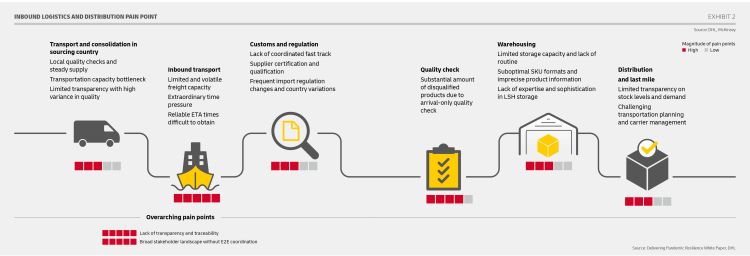Archives
Air, Feature, Forwarding, Freight News, Logistics
Covid vaccine set to pose unprecedented cool chain challenge, says DHL
[ September 3, 2020 // Chris ]The first Covid vaccines could be subject to extremely stringent conditions during transport, says global logistics operator DHL.
DHL says that currently, more than 250 vaccines across seven platforms are being developed and trialled but as various development phases have been leapfrogged, stringent temperature requirements (up to -80°C) are likely to be imposed for some products during transportation and warehousing to ensure efficacy. This poses novel logistics challenges to the existing medical supply chain that conventionally distributes vaccines at around 2-8°C, it says.
With first authorisations for Covid-19 vaccines expected to be available in the last quarter of 2020, DHL and its analytics partner McKinsey & Company has published a white paper on delivering stable logistics for medical goods.
The scope of the task is “immense”, DHL continues. To provide global coverage, up to 200,000 pallet shipments and 15 million deliveries in cooling boxes as well as 15,000 flights will be required.
DHL chief commercial officer, Katja Busch, explained:
“The Covid-19 crisis …required governments, businesses, and the logistics industry to adapt quickly to new challenges. As a world leader in logistics, we want to share our experience of operating during one of the biggest health crises in recent history, in order to develop strategies in an ever-more connected world.”
She added: “To protect lives against the pandemic, governments have moved towards a more active role in medical supply chains. Over the past few months, we have demonstrated that sufficient planning and appropriate partnerships within the supply chain can play a key role as governments work to secure critical medical supplies during health emergencies such as this.”
Since the outbreak of the pandemic, demand for medical supplies has surged. For example, UNICEF sourced 100 times more face masks and 2,000 times more medical gloves than in 2019. Bringing medical supplies from their distant sources to use at the frontline has been one of the most crucial activities in pandemic response management in the first phase of the health emergency. Inbound logistics for PPE was a major challenge due to geographically concentrated production, limited airfreight capacity and a lack of inbound quality checks.To ensure stable medical supply in a future health crisis, a comprehensive setup of public health crisis strategies and structures needs to be established by governments with partnerships from both public and private sectors.
To kick start the dialogue among the different actors and improve pandemic resilience in medical supply logistics, DHL says it is providing a framework for the cooperation of logistics companies with authorities, politicians, NGOs and the life sciences industry. This will help to establish measures to ensure the most stable and safe supply chains possible. Besides an emergency response plan, this includes a partnership network, strong physical logistics infrastructure and IT-enabled supply chain transparency.
A response unit with a clear mandate should also be put in place to implement all critical activities at short notice.

Tags: DHL











